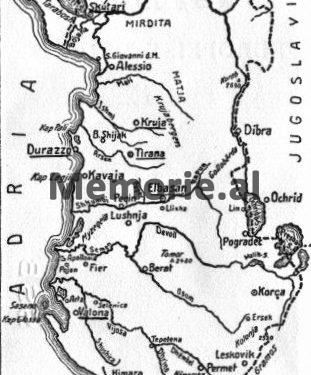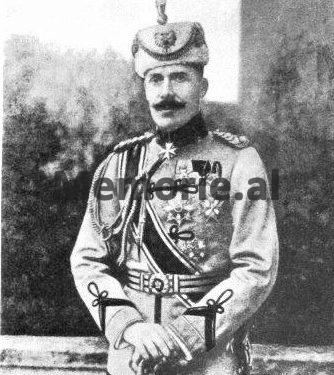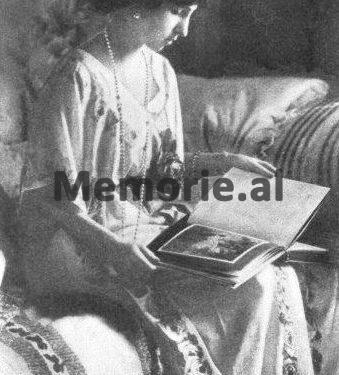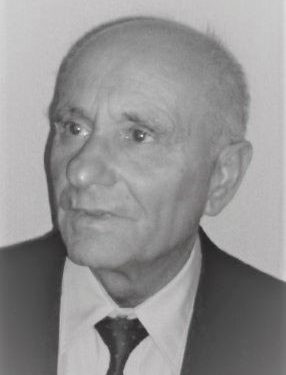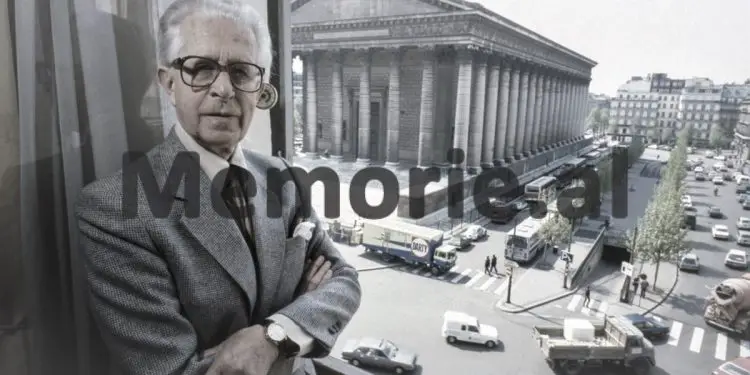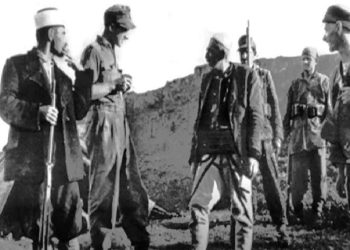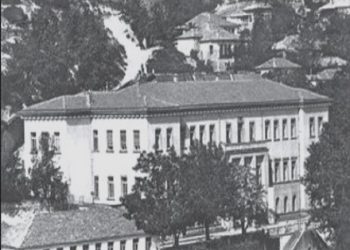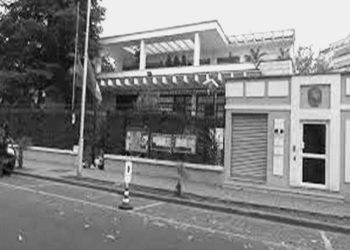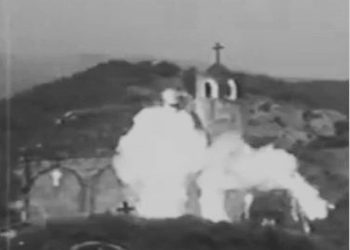By Sven Aurén
Translated by Adil N. Bicaku
The third part
ORIENTI EUROPE
Land of Albania! Let me bend my eyes
On thee, thou rugged nurse of savage men.
Lord Byron.
In the book “Orient of Europe”, the author of the work is the Swede Sven Aurén. They are impressions of traveling from Albania from the ‘30s. His direct experiences without any retouching.
In a word, the translation of the book will bring to the Albanian reader, the original value of knowing that story that we have not known and we continue to know it, and now distorted by the interests of the moment.
Now a little about what these lines address to you: My name is Adil Bicaku. I have worked and lived for over 50 years in Sweden, without detaching for a moment, the thought and feeling from our Albania.
I am now retired and living with my wife and children, here in Stockholm. Having been for a long time, from the evolution of the Albanian language, which naturally happened during these decades, I am aware of the difficulties, not small, that I will face, to give the Albanian reader, the experiences of the original.
Therefore, I would be very grateful if we could find a practical way of cooperation together, to translate this book with multifaceted values.
Morally, I would feel very relieved, paying off part of the debt that all of us Albanians owe to our Albania, especially in these times that continue to be so turbulent.
With much respect
Adil Biçaku
Continued from the previous issue
Skanderbeg must be crushed, the Sultan’s High Council decides, and the Viziers ponder how best to plan the Albanian military operation, to give the right effect. The Prophet’s soldiers have conquered states and can princes, of caliber quite different from this treacherous mountain chief. It is a matter of prestige for the military leadership to be able to throw that ridiculous goat helmet at the Sultan’s feet and report the fall of Kruja.
One after another, the Turkish armies marched on the difficult roads over the mountains of Albania and surrounded the areas around Kruja, which was protected by small forces. But the terrain is wild and terrible and the Albanians knew every mountain top, every passage, and every gorge, very brave and godly warriors. The same grim story continues to be repeated: great losses and horrific retreats, under constant guerrilla warfare. The Turks numbered tens of thousands killed, after every great battle. They make great efforts and arm an army of 100,000 men, a terrible army, according to the situation of the time. With 20,000 Albanians and 4,000 Montenegrin aid troops, Skanderbeg inflicted terrible losses on that terrible army and forced it to return.
In this way the wars continue, until the great warrior dies in 1468. Kruja remained for another ten years, but when the sultan’s army, which had besieged it, numbered up to 300,000, it could no longer resist. Albania’s last fortress falls and the whole country becomes completely Turkish. Skanderbeg’s son and his family immigrated to Italy.
It is easy to imagine how the policy of the Turkish superpower would develop, if Skanderbeg did not stop it for 25 years, if in the first punitive operation, he had managed to suppress the giant defender of Kruja. The meaning of the Albanian hero should not be exaggerated, but it is certain that Skanderbeg’s contribution had a world historical impact and this fabulous heroism stopped Muhammadan innovation and gave the Christian world the opportunity to call for unity. There are historians who claim that if Skanderbeg had not prevented that dream of Turkish greatness, it would have come true, on a larger scale than it did.
However he has gone down in history as the greatest and most powerful fighting figure of the middle Ages. He is the only leader of the people in Albania and the tragic prince, av Wied, who attracted the attention of Europe in a way that constitutes great politics. One of the portraits of Albrecht Dyrers, is said to represent the popular Albanian hero. According to the collections of folk songs and legends of the Renaissance writer Barleti, he entered the literature and, among other things, inspired Lonfellov, for the enthusiastic poem. The new Albanian literature has been taken and dealt with Skanderbeg on a large scale.
So that young Albanian writers describe the fate of Skanderbeg’s amazing life is understandable and natural. Skanderbeg is the hero of the Albanian people. May the newborn nation also have a symbol of greater unity, than this warrior, who ignited the love for freedom in the hearts of Albanians and ignited it in such a way that a world superpower is forced to bow down and stop, otherwise, all triumphant marches? The memory of Skanderbeg is a moral food, for the revived nation.
The helmet with the goat’s head is the memory of the outer figure. With the feeling of great respect for the sacred tradition, the helmet is placed as a symbol of the monarchist state. It would be very simple for this state, which seven years ago, suddenly found itself in the Monarchy, to have placed a crown, on the double-headed eagle, in the emblem of its state. King Zog has chosen Skanderbeg’s helmet, instead of the royal crown. This has great significance, in terms of his abilities and spiritual structure.
This is in fact an irony of fate, that the original helmet, which continues to exist, is not Albanian-owned. It is on display in a museum in Vienna and is an Austrian state property. Albanians are satisfied with a copy. The Austrian Republic has not considered that there is any reason to return the helmet to Albania, this helmet that for the Austrians is a curiosity, but for the Albanians, the symbol of the meaning of the nation and the royal crown of Zog I.
Those four hundred years that followed are four hundred years, gloomy under Turkish rule, with cultural stagnation, fruitless uprisings, and borderless poverty, these as the main characteristics. Albania was a very valuable property for the sultans. This was used as a tax object even though the sums, which the corrupt governors collected and poured into the state coffers, constituted only a minority of the actual payments. The country offered great opportunities in terms of recruitment to the large Turkish armies. They had men in their ranks, which became extremely useful to the sultans.
No less than 25 great viziers, Turkey has received from the Albanian mountains, intelligent, brave men, sometimes so brave, which “disappeared” in one way or another. The Austrian writer Roda-Roda, in his wise books, makes a small remark, which is somewhat amusing. During the time of Turkey, Albania did not need a cemetery, he writes. The common people, died in carnage on foreign lands, and the great viziers, received orders to resign, or were thrown into the Bosphorus.
This revered Roda-Roda certainly exaggerates, but there are plenty of truths in his words. For almost half a millennium, the Albanian people have been forced to make life and labor available to Turkey. They received nothing in return. No roads, no schools, no literature, nothing that could help them, to some extent; keep pace with other European countries.
The four-hundred-year Turkish rule was intentional and of a negative type. The High Gate understood more than well what dangers an inevitable spiritual and material-cultural development would bring and as a consequence of this attitude; Turkish politics in Albania took on an oppressive and backward character. Schools are banned. Books and newspapers are banned. Yes, they even opposed the creation of an Albanian written language. The roads could have facilitated a dangerous contact with the west, so the roads were left to collapse.
To keep the country still subjugated, Turkish rulers understood and fostered the heterogeneity of domestic politics. Through bribes, promises and threats, Turkish agents tried to enter the war, with each other important highland leaders, instead of fighting Turkey. The more the division increased, the more the lords of the High Gate rejoiced. Albania was a valuable icon, only to be treated fairly. This is not a coincidence which seems like an idea, that the one, who announced the decision to overthrow Abdyl Hamid, was exactly an Albanian. Only one of the conspirators dared to take on that unpleasant mission: Esat Pash Toptani, one of the most interesting and unscrupulous figures in Albanian history.
Esat, took the audience to the terrified and half-mad Sultan and presented his mission, fully aware that, except for a small sign from the overthrown ruler, he would have laid it on the floor pierced by bullets. There is no Albanian nation, Bismarck said at the Berlin conference in 1878. Abdyl Hamidi knew that Bismarck was wrong. He used great care and incredible amounts to keep Albania in chess and yet it was an Albanian who definitely communicated to him the downfall.
There was no lack of freedom movements during this time, but for the aforementioned reasons, they had no prospects of success. Turkey was rich and Albania poor. There were also other figures, who came out above the average and whose names have gone down in history. Ali Pash Tepelena, managed to gain independence, in a small part of southern Albania and gained an international reputation, something like among others, presented from this context that Napoleon, corresponded with him in terms of some troop reinforcements.
But he was killed and with it the hope for a greater spread of independence was dashed. Around the beginning of the 1900s, it seemed to be shining. That sick man of the Bosphorus, is on his deathbed and the great European powers smell his corpse. Albania was from the old tradition a country that you can treat as you want. After the war of 1878, the Great Powers forgave a part of the country, Montenegro, Serbia and Greece, which resulted in bloody uprisings in the given territories.
Italy rubbed its hands in excitement. Italy is an old specialist, to fish in turbulent waters and is preparing to advance, with a proposal for an Italian mandate over Albania, analogous to what Austria exercises over Bosnia. The more chaos in Albania, the more reasons for an official acceptance of the Italian “experiment of civilization”. But Italy is by no means the only one that aspires for Albanian influence. Slavic bloc exerts pressure. Serbian schools open on Albanian soil and Serbian agents sow discord and mistrust. Russia pays. The Greeks use another method. The Greek Orthodox Church serves imperialist interests.
Greek books and Greek teachers flood the southern part of the country; popes preach the superiority of their Church and the curse of Islam. From all sides, new offenders flood the country. In the Yildiz corner in Constantinople, stands Abdyl Hamidi, terrified and enraged, aware of the dangers that threaten, a significant part of his country, but abandoned and filled with misinformation. The lord of two continents and two oceans, foreboding that he will soon choose a more modest title.
While the great powers and small states, in various groups and alliances, take advantage of the weak Turkish situation, the Albanian people also try to take advantage of the situation. They form secret clubs, secretly publish newspapers and books. The idea of national unity is rekindled. The “Union for the Protection of the Rights of the Albanian Nation” is established and many members join it. Songs about Skënderbeu are sung from Shkodra to Ioannina.
Then the Balkan War broke out in 1912 and briefly thwarted this flood of passion for freedom. Later, 28 Nandori happened, the same year and with it for the first time the declaration of independence of Albania. Under the leadership of Ismail Bey Qemali, eighty-three representatives of the people of Albania gathered in Vlora and all over the world, the sensational news is announced that Albania has become a free and independent nation.
For the first time in history.
But what does it mean in reality now, that a group of Albanian nationalists, satisfied with the declaration of freedom and independence “Albanian nation”? The six great powers, which gathered in London and dealt with the question of the division of the European parts of shattered Turkey, had little interest in the events in Vlora. The first pure Albanian government in world history tried in vain to have its voice heard.
Her situation was extremely delicate. Outside the gates of Vlora, stood the Greek army and a little further, the Turkish one. In northern Albania, Serbs waited for the opportune opportunity to penetrate south. At sea the Greeks maintained a strict blockade. It was only with an extraordinary effort that Ismail Qemali, with his two ministers, was able to cross into Italy and from there continue to Paris and London, to talk about the issue of the newly established state.
Around the green table of the conference, the Great Powers were fighting, in fierce discussions, about the future fate of Albania. France supported Greece, which in turn sought to retain Vlora or Epirus. Russia worked hard to secure access to the sea for Serbia and to consolidate Montenegro’s position. Austria-Hungary and Italy, however, found a common interest and tried to keep the Slavs away from the shores of the Adriatic Sea, but in the meantime each eager for that coastline, which fell within the borders of Albania. It was discussed, intrigued, propagated and no aspect was taken into account, for the demands of the Albanian people themselves. Here was the question for the winners, who would share the prey.
Finally, one thing was clear at one point: Albania would become an independent nation. But with what conditions! Territories with over one million Albanians were given to Greeks and Serbs. The independence of the new state would have only a name character. It would be organized in such a way that an Albanian is not elected as head of state, but a foreign prince dependent on the Great Powers. Italy was the nation that rejoiced most in this decision. The Italian diplomats understood what terribly great difficulties the new head of state would face. That anarchy, which was approaching in this way, would motivate even more the Italian claim for an Albanian mandate.
And so it was that, in 1913, the European monarchies were able to offer him a newly established principality for which the various candidates were competing at once with ridiculously disgusting zeal. No less than eleven princes from Germany, France, England, Romania and Turkey, emerged as contenders. Genealogical researchers were engaged, searched in calendars and together they were able to prove ancestry from Skanderbeg and other famous Albanians.
None of those eleven princes had the slightest idea that the throne was created for Albania and not Albania, for the throne of princes. Their intentions and motives were of the dirtiest kind. But a princely throne is a princely throne even though it is located in Albania and besides it: the Albanian people did not look forward to the fact that the next prince would stay in his primitive and backward country, any large part of the year. A few months could be enough, hunting would be good.
For a time it seemed that a non-European contender, the Muslim prince Ahmed Fuad, of direct descent from the Albanian Mehmet Ali, who in his time founded the Kedive dynasty in Egypt, would have the greatest chance. But as it turned out, the Great Powers did not consider Ahmed Fuad, to be a truly loyal candidate. It was decided that in his place, for Prince Wilhelm av Wied, a weak, maneuverable and light-minded man without any talent, he would cause trouble to the tutors in foreign policy. His tribal connection with Queen Elizabeth of Romania established a suitable connection in the Balkans.
The Albanian people were informed about the election of their new Monarch and were asked to prepare for a dignified reception.
The short tale of Prince av Wied, was a wonderful lesson for the excessive courage of Europe. It is easy to shrug my shoulders about the Balkans and talk about operetta. This unbelievable operetta, which Europe has seen, did not have a Balkan nobleman in the lead role, but a prince of Central Europe, the Prussian prince, Officer Wilhelm av Wied. The conference of the superpowers in London had played the overture. On March 7, 1914 the scene of the first act was opened. Memorie.al




